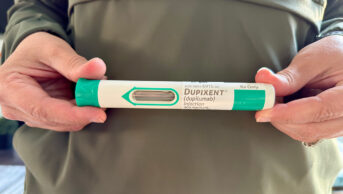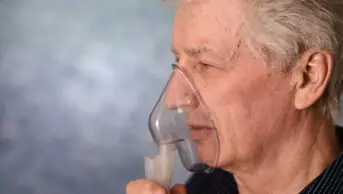
Shutterstock.com
Dupilumab, a treatment licensed for asthma and eczema, has been found to reduce the rate of acute exacerbations in patients with chronic obstructive pulmonary disease (COPD), study results have shown.
The phase III, randomised trial — carried out by researchers at the University of Alabama at Birmingham — included 939 patients located at 275 sites in 24 countries who had been diagnosed with COPD for at least 12 months before inclusion in the trial.
Some 468 patients were given subcutaneous dupilumab 300mg as add-on therapy, while 471 patients received placebo, once every two weeks for a year.
Dupilumab is a recombinant human monoclonal antibody that is indicated for moderate-to-severe atopic eczema and severe asthma with type 2 inflammation.
A statement published by the University of Alabama at Birmingham on 20 June 2023 claimed that dupilumab “is the first biologic shown to improve clinical outcomes in COPD”.
The study, which was published in the New England Journal of Medicine on 21 May 2023 and funded by Sanofi and Regeneron Pharmaceuticals, measured the annualised rate of moderate or severe COPD exacerbations in the participants.
It found that those who received dupilumab had an annualised rate of 0.78 (95% confidence interval [CI], 0.64 to 0.93) exacerbations, compared with 1.10 (95% CI, 0.93 to 1.30) for patients in the placebo group.
“In symptomatic patients with COPD and evidence of type 2 inflammation who had a high risk of COPD exacerbation, despite the use of standard triple therapy, treatment with dupilumab resulted in a lower annualised rate of moderate or severe exacerbations than placebo,” the authors said.
The authors noted that the trial was conducted during the COVID-19 pandemic, which “may have contributed to challenges in recruitment and decreased frequencies of COPD exacerbations”.
“Nevertheless, the dupilumab treatment effect was robust and consistent across multiple subgroups and geographic regions,” they said.
In the UK, COPD exacerbations are the second most common cause of emergency hospital admissions, accounting for one in eight hospital admissions overall.
Some 1.2 million people in the UK are affected by COPD; however, by 2030, the NHS predicts that COPD prevalence will increase by 40%, with an annual cost of £2.5bn to the health service.
Study lead author Surya Bhatt, associate professor at the School of Medicine, division of pulmonary, allergy and critical care medicine at the University of Alabama at Birmingham, said dupilumab “has the potential to impact the vicious cycle of exacerbations and lung function decline in patients with COPD with type 2 inflammation and high exacerbation risk, who are already on optimal inhaled triple therapy”.
“To date, studies of anti-interleukin-5 biologic agents in the treatment of COPD have produced mixed results, with respect to reduction in the number of exacerbations, and have provided no evidence of improvement in lung function, abatement of symptoms or increase in quality of life, despite the depletion of eosinophils in peripheral blood that is known to occur with these agents,” he said.
Commenting on the study, Erika Kennington, head of research and innovation at the charity Asthma + Lung UK, said: “For people with COPD with type 2 inflammation, fewer exacerbations, better lung function and less severe symptoms will have a massive benefit and impact on quality of life. This is a positive step forward for COPD treatment but won’t help everyone with the condition. That’s why we need to see more funding for lung research so that we can develop more treatments like dupilumab that will help people live their lives to the fullest.
“Lung conditions are the UK’s third biggest killer, yet they receive just 2% of public investment in research. Asthma + Lung UK are fighting for increased funding so that research and innovation can improve diagnosis, treatment and management, and save millions of lives.”
- This article was updated on 26 June 2023 to include additional comment


